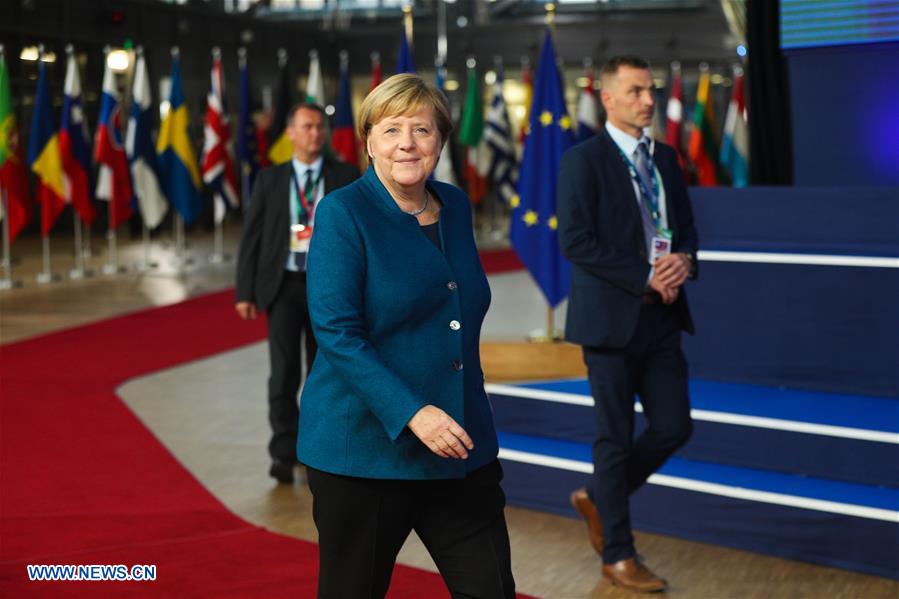Contemplating a post-Merkel Germany
- By George N. Tzogopoulos
 0 Comment(s)
0 Comment(s) Print
Print E-mail China.org.cn, October 27, 2018
E-mail China.org.cn, October 27, 2018

It was September 2017 when German Chancellor Angela Merkel secured a fourth term in office. Yet, despite all her political success and statecraft, it has long been apparent her new – and possibly final – mission would be the most challenging.
Her Christian Democratic Party (CDU) was the clear winner in the Bundestag election without enjoying the impressive percentages of previous federal elections. As a result, Merkel needed to look for political compromises in a public atmosphere of natural fatigue vis-à-vis herself and her party's policies.
Failure to form the so-called Jamaica coalition – with the participation of CDU, its sister party in Bavaria, the Christian Social Union (CSU), the Greens and the Liberals (FDP) – showed how difficult it was for differences to be bridged.
The Greens, but more so the Liberals, sought to impose significant political terms on the national governance plan to demonstrate they wanted a real role not merely satisfying Merkel's demands. Valuable time was lost in delicate negotiations which yielded no fruitful results.
Subsequently, the Social Democratic Party (SDP) showed responsibility. In order to prevent a possible snap election – uncommon in German political culture – it decided to cooperate again with the CDU and the CSU.
A grand coalition was finally established last April, as it had also occurred between 2013 and 2017. The tri-party agreement guaranteed continuity in German politics and eased fears of political instability. However, its long-term sustainability remains questionable.
Merkel's CDU openly disagrees with the CSU led by Interior Minister Horst Seehofer. The management of the refugee crisis and violent related incidents in Chemnitz almost brought down the coalition government. Meanwhile, although the SPD supports the grand coalition as a matter of responsibility, but is paying a high political price.
At the same time, the orientation of the Social Democrats remains unclear as Merkel has managed to integrate most of their policy ideas in the political program of the Christian Democrats.
For their part, German citizens, who sent their first message in the September 2017, have shown their disenchantment when voting in regional elections. The example of Bavaria is telling. The CSU experienced important losses and now needs to politically collaborate with a smaller party, the Free Voters, to form a state government. The SPD saw its percentage fall below 10 percent – another confirmation of its political impasse.
The real winners in Bavaria were the Greens and the Alternative for Germany party (AfD) benefiting from its anti-refugee rhetoric. Merkel and Seehofer downplay the importance of the Bavaria result for the functioning of the German government at the national level, yet both know pressure is rising.
Now, it is the turn of citizens in Hesse to vote. The CDU, SPD and Greens together hope to win enough votes to have the final say over the formation of the local coalition government. However, the CDU and SPD are expected to see their percentages decrease in comparison to the previous election in the state.
By contrast, the Greens have emerged yet again as the only political party able to improve its performance and attract more voters. This will be perhaps a fresh sign that the party will reach a record percentage in the 2021 Bundestag election, although regional elections are always different from the federal one.
Beyond the potential success of the Greens, the Hesse result will be important for two major reasons should both CDU and SPD significantly suffer. First, the CDU December party conference is approaching and Merkel's political domination in the party can no longer be taken for granted.
Second, the SPD might decide to withdraw from the grand coalition in order to play a more constructive role in opposition and better prepare itself for 2021, instead of continuously conceding defeats in the name of assuring political stability in Germany.
If this happens, a minority government will be a likely scenario. The Speaker of the German Parliament, former Finance Minister Wolfgang Schauble, has publicly talked about this possibility.
So, it seems clear German politics are undergoing a phase of restructuring. Merkel's political career as CDU leader and Chancellor will sooner or later come to an end and a viable successor has to be identified ready to take over.
Also, the CDU and CSU need to discuss their conservative agenda to stop the rise of AfD. For SPD it is necessary to escape from the political labyrinth in which most social democratic parties in Europe currently find themselves. And, the Greens should no longer function simply as a protest party only.
Thus, Europe's most successful country – Germany – will surely be a political battlefield with wide-ranging repercussions.
George N. Tzogopoulos is a columnist with China.org.cn. For more information please visit:
http://www.china.org.cn/opinion/GeorgeNTzogopoulos.htm
Opinion articles reflect the views of their authors, not necessarily those of China.org.cn.






Go to Forum >>0 Comment(s)